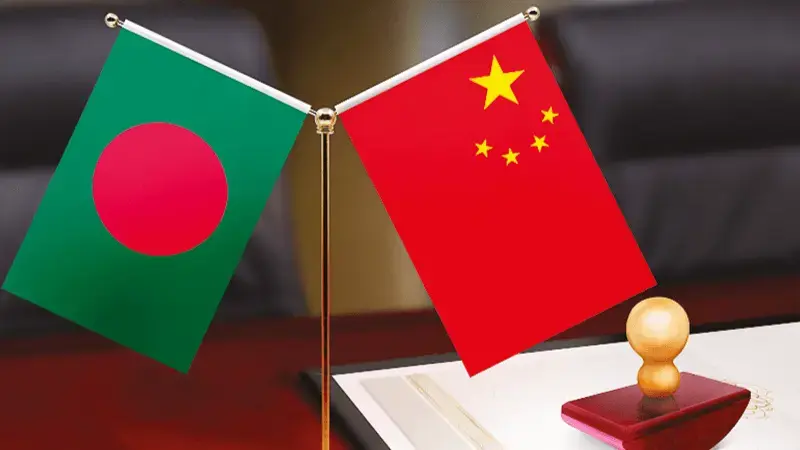Dhaka-Beijing multilateral engagements are likely to increase in the new environment as Sheikh Hasina, the deposed Prime Minister of Bangladesh, and the most trusted partner of neighbouring India, was compelled to quit the power through a massive student protest, according to economists, politicians and policy-makers.
Awami League President Sheikh Hasina who clung to the power on January 7, 2009 through a credible parliament election under the caretaker system quit the power on August 5, 2024.
The new interim government of Nobel laureate Professor Dr. Muhammad Yunus took oath in the city on Thursday and has signaled a clear message of giving their best to the country.
Bangladesh in the last 15 years meticulously maintained balance between China and India with overdependence on the latter. Bangladesh was interested in implementing the Teesta Bridge and also conducted a feasibility study. As India raised concern over implementation of the Teesta bridge on strategical ground by China, the project did not see the light during the Awami League regime in spite of people’s interest in northern part of the country, sources said.
The present interim government under Nobel laureate Professor Dr. Muhammad Yunus will certainly have a strong negotiation capacity that can give the country an edge to increase engagement with China on some projects that the previous Awami League just overlooked, sources said.
According to the Economic Relation Division (ERD) of Bangladesh, during 1999--2000-2023-24, China committed foreign aid valued at 10291.884 million US dollars to Bangladesh and disbursed 6541.983 million US dollars during the same period. However, China committed to disburse 146.34 million US dollars as grants and disbursed 146.34 million US dollars. China promised to give Bangladesh 7253.162 million US dollars as official development assistant (ODA), disbursed 3752.115 million US dollars and repaid 261.633 US dollars.
Meanwhile, China has welcomed Bangladesh's interim government and said Beijing stands ready to work with Bangladesh to promote bilateral exchanges and cooperation in various areas as well as further advance the comprehensive strategic cooperative partnership between the two countries.
"China has noted that Bangladesh has formed an interim government and welcomes it," a spokesperson at the Chinese Ministry of Foreign Affairs said on Friday.
The spokesperson said China strictly follows the principle of non-interference in other countries' internal affairs.
"We respect Bangladesh's independence, sovereignty and territorial integrity and the development path independently chosen by the Bangladeshi people," the spokesperson said.
China stands firmly by its policy of good neighborliness and friendship with all people of Bangladesh.
The spokesperson said that the friendship between China and Bangladesh runs long and deep while China values its relations with Bangladesh.
Meanwhile, at the invitation of Chinese Premier Li Qiang, the then Bangladesh Prime Minister of Bangladesh Sheikh Hasina paid an official visit to China from July 8 to 10, 2024.
During the visit, the then Prime Minister Sheikh Hasina had talks with Chinese President Xi Jinping, Premier Li Qiang and Chairman of the National Committee of the Chinese People’s Political Consultative Conference.
In a cordial and friendly atmosphere, the two sides had in-depth exchange of views on bilateral relations and international and regional issues of mutual interest, and reached extensive consensus.
Former Secretary and Bangladesh Ambassador to China Mahbub Uz Zaman on the recent visit of former Prime Minister Sheikh Hasina to China said “ Experts and analysts often opine that expectations are conditioned by the objective realities of the times . In economics we also say Ceteris Paribus ( other things remaining the same ) . It means that a theory holds good when other exogenous factors remain constant.“
Mahbub Uz Zaman said” When the policy makers of a country discusses the expectations and possible outcome of a visit they tend to set it against the backdrop of the national interests , priorities and objectives . I would tend to compare it with the rational expectation model in economics wherein individuals base their decisions on three primary factors that is their human rationality, the information available to them, and their past experience. “
He also noted “Analysts say that global uncertainties, prospect of recession in 2025 , possibilities of shocks within the emerging markets in some of the G-20 economies, especially China, may have made these economies overtly cautious . China has in fact diminished aid and lending in many cases. On the economic front, reports say that China is facing a slowdown caused by endogenous and external factors “.
During such high level visits, the broad contours, parameters and elements of the possible agreements, MOUS are discussed beforehand whether in a formal or informal context . So there is hardly any element of surprise as to the outcome of the visit from the government side.
The host country often does make it known to the other side beforehand to what extent the requests and proposals can be accommodated . It is not negotiated per se at the time of the visit.
It is difficult to quantify the immediate gains and benefits of a visit . It is a continuous and dynamic process and yields benefits over a period of time . Even we see that some of the benefits are not immediately visible . The major achievement of a visit is the political commitment and understanding reached by the leaders of both the sides . This sets the tone for future cooperation in the political and economic sphere, said Mahbub Uz Zaman.
Viewed in a broad and macro perspective the visit has yielded positive outcomes . We can liken it to a positive sum game in a game theory where all participants gain through a mutually beneficial interaction . It has created a basis and platform through which the two sides could interact and follow up on the identified property area and sectors in the short and medium term, he added.
“In fact we could relate the visit as a continuum of the deepening and consolidation of partnership between the two countries as declared in the Joint Statement of 2016 . It was stated therein that “ Based on the common aspiration for and the bright future of the cooperation between the two countries, both sides agreed to elevate the bilateral relations to the Strategic Partnership of Cooperation. “ In the Joint Statement of 2024 it has been further elevated wherein it has been stated that “ Leaders of the two countries agreed to stay committed to the Five Principles of Peaceful Coexistence, carry forward the long-standing friendship, foster greater synergy between development strategies of the two countries, advance the Belt and Road cooperation, and elevate the bilateral relationship to a comprehensive strategic cooperative partnership,” said Mahbub Uz Zaman. .
Bangladesh and China have agreed to elevate the relations to a "comprehensive strategic cooperative partnership" from "strategic partnership", said a joint statement.
Bangladesh foreign ministry published the 27-point joint statement on its website after Prime Minister Sheikh Hasina wrapped up her three-day bilateral visit to China from June 8 to 10.
In the joint statement, the two sides have shared the view that early repatriation is the only way to resolve the issue concerning the displaced people from Myanmar, who have taken shelter in Bangladesh.
"Leaders of the two countries agreed to stay committed to the Five Principles of Peaceful Coexistence, carry forward the long-standing friendship, foster greater synergy between development strategies of the two countries, advance the Belt and Road cooperation, and elevate the bilateral relationship to a comprehensive strategic cooperative partnership," the statement said.
Bangladesh and China applauded their strategic partnership of cooperation established in 2016 and agreed that the China-Bangladesh relationship has reached a new height.
The two countries decided to take the opportunity of celebrating the 50th anniversary of the establishment of China-Bangladesh diplomatic relations in 2025 to plan together for the future development of bilateral ties and take the China-Bangladesh relationship to another new height.
The Bangladesh side congratulated the Chinese side on the 75th anniversary of the founding of the People’s Republic of China, and applauded China’s historic achievements and transformation in economic and social development in the new era.
Bangladesh lauded China’s efforts to build itself into a great modern socialist country in all respects and advance the great rejuvenation of the Chinese nation on all fronts through the Chinese path to modernization, and expressed sincere wish for China to realize the Chinese dream of national rejuvenation as scheduled.
The Chinese side applauded the achievements of Bangladesh in economic and social development, and expressed continued support for Bangladesh’s graduation from the UN Least Developed Countries (LDC) status in 2026 as scheduled and Bangladesh’s steady progress toward realizing its Vision 2041 of a “Smart Bangladesh.”
The two sides applauded their strategic partnership of cooperation established in 2016, and agreed that the China-Bangladesh relationship has reached a new height.
Leaders of the two countries agreed to stay committed to the Five Principles of Peaceful Coexistence, carry forward the long-standing friendship, foster greater synergy between development strategies of the two countries, advance the Belt and Road cooperation, and elevate the bilateral relationship to a comprehensive strategic cooperative partnership.
The two sides decided to take the opportunity of celebrating the 50th anniversary of the establishment of China-Bangladesh diplomatic relations in 2025 to plan together for the future development of bilateral ties and take the China-Bangladesh relationship to another new height.
The two sides agreed that China and Bangladesh have been good neighbors and good friends since ancient times, sharing a millennium-old history of friendly exchanges.
Over the past 49 years since the establishment of diplomatic relations, the traditional China-Bangladesh friendship forged by generations of leaders of both countries has grown from strength to strength. The two countries have always respected each other, treated each other as equals, and pursued mutual benefits.
With ever deepening mutual trust, the two countries have achieved fruitful outcomes in their practical cooperation, and kept close collaboration in international and regional affairs, thus setting a fine example of friendship and mutually beneficial cooperation in relations between countries.
The two sides reaffirmed their commitment to mutual respect for each other’s sovereignty, independence and territorial integrity, and to mutual understanding and support on issues involving each other’s core interests and major concerns.
The Chinese side firmly supports Bangladesh in maintaining peace and stability, realizing development goals as envisioned under Vision 2041, non-interference in its internal affairs, and independently choosing a development path suited to its national conditions. The two sides stressed that the authority of the U.N. General Assembly Resolution 2758 is beyond question and brooks no challenge.
Bangladesh reiterated its firm commitment to the one-China principle and its position that the Government of the People’s Republic of China represents the whole of China, and Taiwan is part of China, and Bangladesh supports China on issues pertaining to China's core interests and China's efforts to safeguard its national sovereignty and territorial integrity.
The two sides agreed to maintain the momentum of high-level interactions, and enhance strategic communication and deepen strategic mutual trust through visits, exchange of letters, and meetings on multilateral occasions. Both sides agreed to promote closer exchanges and cooperation at official and people-to-people levels.
Both sides expressed satisfaction at interactions between political parties, especially between the governing parties to exchange views on issues of mutual interests.
The Bangladesh side expressed appreciation and thanks for China’s support for Bangladesh’s economic and social development, and applauded the important role played by the Belt and Road Initiative (BRI) in promoting the socio-economic development of the people of Bangladesh.
The Chinese side commended Bangladesh for being the first country in South Asia to join and take part in the BRI.
The two sides agreed to step up experience sharing on development planning and economic development policies, and further deepen high-quality Belt and Road cooperation under the principle of planning together, building together and benefiting together. The two sides will accelerate existing cooperation projects, continue to expand areas of cooperation and work toward more fruitful outcomes in practical cooperation between the two countries.
The Chinese side supported the Bangladesh side’s plan to implement the Southern Integrated Development Initiatives of Bangladesh, among others, under the framework of the Belt and Road Initiative to help this region achieve balanced and sustainable development.
The Chinese side will encourage Chinese enterprises to take an active part in the construction of subways, metro rail and roads, oil and gas exploration, hospitals and water resources and sewage management projects in Bangladesh in a proper way.
The two sides agreed to advance projects such as the Burn Unit in Chattogram Medical College Hospital, the No. 6 Bangladesh-China Friendship Bridge Renovation, the No. 9 Bangladesh-China Friendship Bridge, and the National Emergency Operation Center in Bangladesh.
The Chinese side expressed readiness to continue providing assistance to Bangladesh to the best of its capacity and positively consider the possibility of building hospitals and bridges and renovating convention centers to support economic and social development of Bangladesh.
The Chinese side will continue to provide support for training programs on human resources development of Bangladesh under the framework of “China Aid,”.
The two sides agreed to deepen cooperation in trade, investment and finance, conclude the joint feasibility study on a China-Bangladesh free trade agreement, and launch formal negotiations as soon as possible. China has completed the entry procedures for Bangladesh’s fresh mango exports to China, and welcomes Bangladesh to expand exports of jute, leather, aquatic products and other high-quality special products to China.
The two sides agreed to further strengthen communication on the export of high-quality Bangladeshi agricultural products to China.
The two sides agreed to strengthen cooperation on trade promotion. China welcomes Bangladesh’s participation in the China International Import Expo, the China Import and Export Fair, the China-South Asia Expo and other expos. The two sides discussed future cooperation on trade facilitation, aid, and financing for projects or programmes.
The Bangladesh side expressed its appreciation to China for granting zero-tariff treatment on 98 percent of taxable items to Bangladesh, effective from 1 September 2022. The Chinese side has expressed its support to continue the zero-tariff treatment on 98 percent of taxable items to Bangladesh for a transitional period beyond 2026 when Bangladesh will graduate from LDC status.
The two sides agreed to launch negotiations on upgrading the China-Bangladesh Investment Agreement as soon as possible. The two sides expressed satisfaction with the progress in projects invested by Chinese enterprises in Bangladesh.
The Bangladesh side welcomes more investment from Chinese enterprises in Bangladesh in such areas as economic and industrial parks, oil and gas exploration, new energy, water resources and sewage management, garment and other manufacturing sectors, reiterates Bangladesh’s commitments to protecting the security and legitimate rights and interests of all foreign investments including the Chinese projects and personnel in Bangladesh. The two sides agreed to deepen cooperation in infrastructure and construction projects, including through the PPP model.
The two sides agreed to enhance cooperation in financial regulation, and encouraged increased use of local currency settlement in bilateral trade. The Bangladesh side welcomes Chinese banks to establish branches in Bangladesh, and vice versa.
The Chinese side expressed its readiness to support and participate in building “Smart Bangladesh,” promote cooperation between digital and ICT think tanks of the two countries, and explore the joint establishment of a digital innovation lab to carry out digital capacity building.
The two sides agreed to strengthen investment cooperation in the field of digital economy. The Chinese side will support bilateral exchanges on digital economy industries, encourage Chinese software companies to empower Bangladesh’s digital infrastructure development, and explore the establishment of a China-Bangladesh innovation cooperation mechanism in cloud computing, to promote the development of Bangladesh’s digital and ICT industries.
The Chinese side expressed its readiness to carry out cooperation on the “international port for the information industry and digital trade” to promote digitization of bilateral trade. The Bangladesh side applauded and expressed thanks for these initiatives.
The two sides agreed to enhance cooperation in such fields as agriculture, meteorology, water management and ecological protection.
Both sides agreed to continue harnessing the China-Bangladesh Joint Agriculture Committee to further explore cooperation in hybrid rice and wheat breeding, planting techniques and agricultural machinery equipment, so as to promote the common development of the two countries in agriculture and food security.
Both sides expressed their willingness to further strengthen cooperation in the fields of hydrological forecasting, river dredging, integrated management of water resources, and flood and drought prevention.
Appreciating Bangladesh’s efforts in combating the adverse effect of climate change, the Chinese side reaffirmed its commitment to continuing cooperation with Bangladesh both at bilateral and international levels.
The two sides will leverage the BRI International Green Development Coalition and other platforms to deepen exchanges and cooperation in the fields of pollution prevention and control, and ecological protection, in order to promote green and low-carbon development together. Both sides agreed to enhance cooperation in meteorological disaster prevention and reduction to jointly implement the U.N. “Early Warnings for All” initiative.
The two sides agreed to strengthen exchanges and cooperation in health, encourage medical institutions of both countries to deepen practical cooperation in such fields as prevention and treatment of infectious diseases, diagnosis and treatment of chronic diseases, and digitization of health services, and promoting technical exchanges in the research and development of pharmaceuticals, vaccines and medical devices.
The two sides recognized the important role of educational exchanges and cooperation in promoting understanding and friendship between the two countries, and agreed to advance exchanges between students, teachers and researchers at various levels, encourage educational institutions of the two sides to carry out cooperative research and joint training, and pursue practical cooperation in the fields of higher, vocational and digital education and Bangla and Chinese language teaching.
The two sides will support universities of China and Bangladesh in co-building Confucius Institutes, encourage educational institutions of the two countries to set up majors and courses on the Chinese and Bangla languages, and support each other in cultivating high-level language talents. The two sides agreed to establish a Luban Workshop in Bangladesh.
The two sides agreed to deepen people-to-people exchanges and cooperation, and designate the year of 2025 as the “China-Bangladesh Year of People-to-People Exchanges” to promote interactions between the two countries in the fields of culture, tourism, media, think tanks, sports, youth, women, and persons with disabilities.
The two sides will encourage stronger exchange and experience sharing between artists of the two countries in fine arts, music, dance, theater and movies.
On defense cooperation, the two sides agreed to strengthen more exchanges at all levels and between various armed forces and departments, and deepen practical cooperation in defense. Both sides agreed to maintain their mutual understanding and engagement on UN peacekeeping and peace building issues.
The two sides agreed to strengthen coordination in international and multilateral affairs, and expressed readiness to further coordinate positions and build broader consensus in multilateral processes concerning international peace and security, sustainable development, human rights, humanitarian affairs, climate change, energy transition and environmental protection, to jointly safeguard the common interest of developing countries.
Bearing in mind that this year marks the 70th anniversary of the Five Principles of Peaceful Coexistence, the two sides agreed on the need to carry forward the Five Principles of mutual respect for sovereignty and territorial integrity, mutual non-aggression, mutual non-interference in each other’s internal affairs, equality and mutual benefit, and peaceful coexistence, with a view to jointly building a community with a shared future for Asia and for mankind.
The two sides agreed to firmly safeguard the international system with the UN at its core, the international order underpinned by international law, and the basic norms governing international relations based on the purposes and principles of the UN Charter, uphold true multilateralism together, promote greater democracy in international relations, and work to foster an equal and orderly multipolar world and a universally beneficial and inclusive economic globalization.
The two sides agreed to further strengthen coordination and collaboration in multilateral organizations and mechanisms such as the United Nations, World Trade Organization and ASEAN Regional Forum.
The Chinese side welcomes Bangladesh’s bid for BRICS membership and interest in associating with SCO.
The Bangladesh side expressed appreciation for China’s efforts to successfully establish the “International Day for Dialogue among Civilizations” and its important role in promoting mutual understanding and respect among civilizations, cultures and religions.
The Chinese side congratulated Bangladesh on the 25th anniversary of its flagship Resolution on a “Culture of Peace,” first mooted by Prime Minister Sheikh Hasina in 1999.
The two sides reiterated that the fundamental way out of the ongoing grave crisis in Gaza lies in the implementation of the two-State solution and the establishment of an independent State of Palestine.








.svg)
